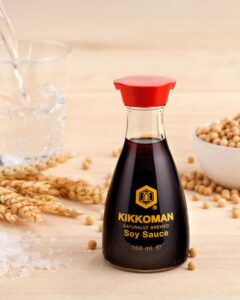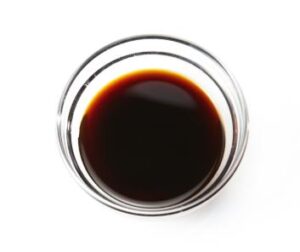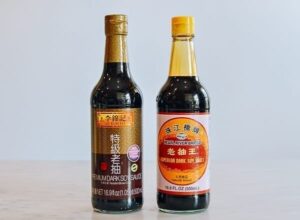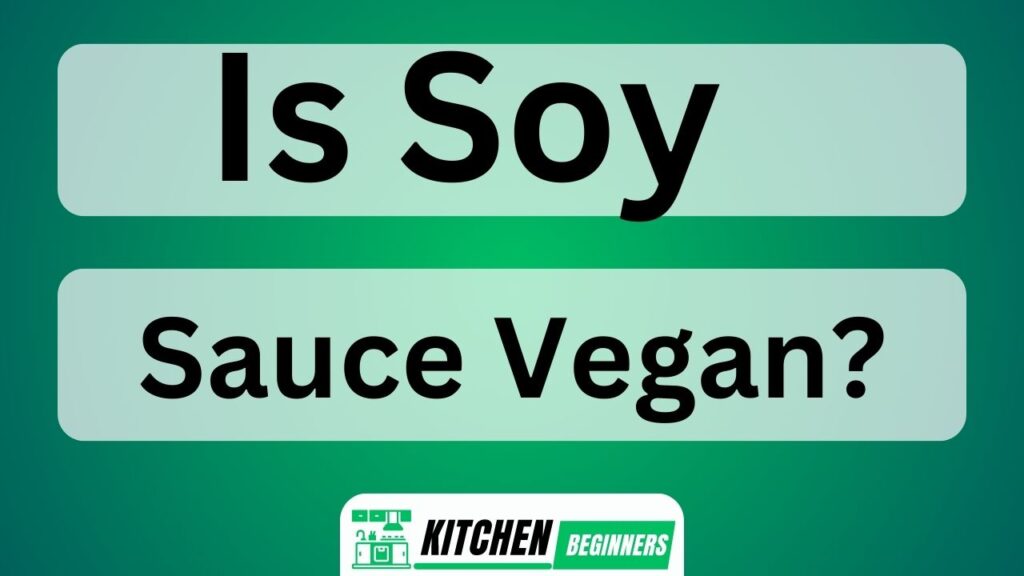Soy sauce, a staple condiment in many Asian cuisines, has long been an essential ingredient for adding depth and flavor to dishes. But is this dark, savory elixir truly vegan?
In this article, we delve into the truth behind soy sauce’s origins and ingredients to determine whether it aligns with a plant-based lifestyle. By examining its manufacturing process and exploring alternative options, we aim to provide you with all the facts necessary to make an informed decision about incorporating soy sauce into your vegan diet.
Key Takeaways Is Soy Sauce Vegan
- Soy sauce is commonly used in Asian cuisine and has a long history of use in the region.
- Traditional soy sauces are typically vegan, but some brands may use fish or shellfish for flavoring.
- Vegan alternatives labeled as ‘vegan’ or ‘vegetarian’ are available for those who want to avoid animal ingredients.
- Plant-based alternatives like tamari and shoyu can be used as substitutes for soy sauce.
What Is Soy Sauce
Soy sauce is a savory condiment made from fermented soybeans, wheat, water, and salt. It has been used for centuries in Asian cuisine to add depth of flavor to dishes.

There are several benefits associated with consuming soy sauce. It contains essential amino acids that our bodies need for proper functioning. Additionally, it is a good source of protein and iron. Soy sauce also offers antioxidant properties due to the presence of certain compounds like phytochemicals.
When it comes to different types of soy sauce, there are various variations such as light soy sauce, dark soy sauce, and tamari sauce which is gluten-free. These different types have distinct flavors and can be used in different recipes depending on personal preference or dietary restrictions.
Moving on to the subsequent section about ingredients in soy sauce…
Ingredients in Soy Sauce
If you’re wondering about the ingredients, you’ll be glad to know that most soy sauces are made from fermented soybeans. Soy sauce is typically a combination of soybeans, wheat, water, and salt. However, there are also gluten-free versions available for those with gluten sensitivities or allergies.

As for vegan alternatives, there are several options on the market. Tamari sauce is a popular alternative that is made without wheat and usually has a richer flavor compared to regular soy sauce. Coconut aminos are another vegan option that are made from aged coconut sap and have a slightly sweeter taste.
In terms of health benefits, soy sauce is low in calories and fat, but it does contain high levels of sodium. It also contains antioxidants called phytochemicals which may have various health benefits including reducing inflammation and promoting heart health.
The Manufacturing Process of Soy Sauce
The manufacturing process of soy sauce typically involves fermenting soybeans and wheat with salt and water. This fermentation process is what gives soy sauce its distinct flavor and aroma. The process starts by cooking the soybeans and wheat, then grinding them into a paste.

This paste is mixed with salt and water to create a mash, which is then left to ferment for several months or even years. During this fermentation period, naturally occurring microorganisms break down the proteins and carbohydrates in the mash, resulting in the formation of amino acids, organic acids, and various other compounds that contribute to the unique taste of soy sauce.
Here is an example of a table outlining the steps involved in the manufacturing process of soy sauce:
| Step | Description |
|---|---|
| 1 | Cooking soybeans and wheat |
| 2 | Grinding into a paste |
| 3 | Mixing with salt and water to create a mash |
| 4 | Fermenting for several months or years |
Overall, the manufacturing process of soy sauce requires patience and careful monitoring to achieve the desired flavor profile.
Is Soy Sauce Made From Animals
Soy sauce is a staple condiment in many cuisines around the world, but not everyone may be aware of its potential animal ingredients. This discussion will delve into the topic of whether soy sauce is made from animals, including exploring the presence of any animal-derived additives or flavorings in traditional soy sauce recipes.

Additionally, it will address the availability and popularity of plant-based and vegan-friendly alternatives for those who prefer to avoid animal products.
Animal Ingredients in Soy Sauce
You might be surprised to learn that some brands of soy sauce contain animal ingredients. While soy sauce is generally considered vegan, certain varieties may include additives or flavor enhancers derived from animals.
Here are some key points to consider when it comes to animal ingredients in soy sauce:
- Some brands of soy sauce use fish or shellfish as a source of umami flavor.
- Traditional Japanese soy sauces, such as tamari and shoyu, are usually made without animal-derived ingredients.
- There are vegan alternatives available for those who prefer to avoid animal products, including soy sauces labeled as ‘vegan’ or ‘vegetarian.’
It’s important for vegans and vegetarians to carefully read labels and choose brands that align with their dietary preferences. By doing so, they can enjoy the savory taste of soy sauce without compromising their lifestyle choices.
Plant-Based Soy Sauce
If you’re looking for a plant-based alternative, consider trying out tamari or shoyu soy sauce. These plant-based condiments are vegan friendly flavorings that can be used as substitutes for traditional soy sauce.
Tamari is a type of soy sauce that is made without wheat and is therefore gluten-free. It has a rich, savory flavor and is often preferred by those with gluten sensitivities.
Shoyu soy sauce, on the other hand, is made with both soybeans and wheat. However, there are now brands that offer gluten-free versions of shoyu soy sauce as well.
Both tamari and shoyu soy sauce can be used in various dishes to add depth of flavor and umami taste, making them excellent choices for vegans or anyone looking to reduce their consumption of animal products.
Vegan-Friendly Soy Sauce?
For a plant-based option, consider trying tamari or shoyu as alternatives to traditional soy sauce. These vegan soy sauce brands offer a variety of benefits for those following a vegan or vegetarian lifestyle.
- Tamari: Made from fermented soybeans, tamari is often gluten-free and has a milder flavor compared to regular soy sauce.
- Shoyu: A Japanese style soy sauce that combines fermented soybeans with wheat, shoyu has a rich umami taste and is commonly used in Asian cuisine.
Benefits of using vegan soy sauce:
- No animal products: Vegan soy sauces are made without any animal-derived ingredients, making them suitable for vegans and vegetarians.
- Healthier choice: Vegan options tend to have lower sodium content and can be free from additives or preservatives.
- Environmental sustainability: Choosing plant-based options supports sustainable farming practices and reduces the environmental impact associated with animal agriculture.
Transitioning into the subsequent section about ‘is soy sauce plant-based’, it is important to understand the distinction between traditional soy sauces that may contain fish or other non-vegan ingredients versus specifically labeled vegan-friendly options.
Is Soy Sauce Plant-Based
When it comes to soy sauce, you might be wondering if it is plant-based. The answer is yes, soy sauce is made from fermented soybeans and wheat or other grains, making it a plant-based condiment. However, if you have dietary restrictions such as gluten intolerance or sensitivity, you need to be cautious. Traditional soy sauce contains wheat, which means it is not gluten-free. Luckily, there are gluten-free alternatives available in the market that use alternative ingredients like tamari (made from only fermented soybeans) or coconut aminos (made from coconut sap). As for its health benefits, soy sauce contains essential amino acids and minerals like iron and potassium. However, it also has high sodium content, so moderation is key.
| Gluten-Free | Healthy |
|---|---|
| Alternative | Essential Amino Acids |
| Tamari | Iron and Potassium |
| Coconut Aminos | High Sodium Content (Moderation) |
Is Soy Sauce Free From Animal Products
Soy sauce is a popular condiment used in many cuisines around the world. To understand if soy sauce is free from animal products, it’s important to examine its ingredients.
One key aspect to consider is whether the fermentation process of soy sauce can be considered vegan-friendly.
Soy Sauce Ingredients
If you’re curious about the ingredients in soy sauce, you’ll be interested to know that it typically includes soybeans, wheat, salt, and water. Soy sauce is made by fermenting soybeans and wheat together with salt and water for a period of time. This process gives soy sauce its distinct flavor and aroma.
Soy sauce is known for its umami taste and is a staple in many Asian cuisines. It not only adds depth of flavor to dishes but also offers several benefits. Some of the benefits of consuming soy sauce include:
- A good source of protein: Soybeans are rich in protein, making soy sauce a suitable option for individuals following vegetarian or vegan diets.
- Antioxidant properties: Soy sauce contains antioxidants that help fight against free radicals in the body.
- May improve digestion: The fermentation process involved in making soy sauce produces beneficial bacteria that can aid digestion.
With its unique taste and versatility, soy sauce can be used in various recipes such as stir-fries, marinades, dressings, and dipping sauces.
Is Soy Fermentation Vegan?
The fermentation process used to make soy sauce creates a product that is suitable for individuals following a plant-based diet. Fermented foods have gained popularity in recent years due to their numerous health benefits and unique flavors. Vegan cooking often involves the use of fermented ingredients, as they add complexity and depth to dishes without the need for animal products. Soy sauce, made from fermented soybeans, salt, and sometimes wheat, is a staple in many cuisines around the world. It adds umami flavor to stir-fries, marinades, and sauces. Here is a table showcasing some popular fermented foods commonly used in vegan cooking:
| Fermented Foods | Flavor Profile |
|---|---|
| Kimchi | Spicy and Tangy |
| Miso | Savory and Earthy |
| Sauerkraut | Sour and Crunchy |
| Tempeh | Nutty and Meaty |
These options provide vegans with plenty of alternatives to soy sauce when looking to enhance their dishes with fermented flavors.
Now let’s explore some alternative options to soy sauce for vegans.
Alternative Options to Soy Sauce for Vegans
You can try using tamari sauce as an alternative to soy sauce if you’re looking for a vegan option. Tamari is a type of Japanese soy sauce that is traditionally made without the addition of wheat, making it suitable for those on a gluten-free or vegan diet. It is made from fermented soybeans and has a rich, savory flavor similar to regular soy sauce.
When it comes to vegan substitutes for soy sauce, there are several homemade options worth exploring:
- Coconut Aminos: Made from the sap of coconut blossoms, this condiment offers a slightly sweeter taste compared to tamari or soy sauce.
- Liquid Aminos: Similar in flavor to tamari or soy sauce, liquid aminos are made by fermenting vegetable proteins and can be used as a direct substitute.
- Mushroom Soy Sauce: This variety combines the flavors of mushrooms with soy sauce, creating a unique taste that works well in stir-fries and marinades.
These alternatives provide vegans with flavorful options when seeking replacements for traditional soy sauce.
Frequently Asked Questions
Can Soy Sauce Be Considered Vegan if It Contains Alcohol?
Soy sauce can be considered vegan even if it contains alcohol. Vegan-friendly alternatives exist. The production process of soy sauce involves fermenting soybeans, wheat, water, and salt, which may sometimes include alcohol as a natural byproduct.
Does Soy Sauce Contain Gluten?
Soy sauce is generally safe for individuals with gluten intolerance as it is made from fermented soybeans, water, salt, and sometimes wheat. Gluten-free options are available, which offer potential health benefits for those avoiding gluten.
Are All Brands of Soy Sauce Suitable for Vegans?
Soy sauce is a popular condiment, but not all brands are suitable for vegans. Some contain ingredients like fish or oyster extract. For those following a plant-based diet, there are alternatives available such as tamari or coconut aminos.
Can Soy Sauce Be Considered Vegetarian?
Soy sauce, a popular condiment with rich umami flavor, can be considered vegetarian since it is made from fermented soybeans and wheat. However, for vegans seeking alternative options, there are also gluten-free and tamari varieties available. Additionally, soy sauce offers health benefits like antioxidants and reduced sodium alternatives.
Are There Any Health Concerns Associated With Consuming Soy Sauce for Vegans?
There are no health concerns associated with consuming soy sauce for vegans. In fact, it offers certain health benefits like being low in calories and fat. Additionally, there are alternative options available for those who prefer not to use soy sauce.
Conclusion
In conclusion, soy sauce is a versatile condiment that adds depth and flavor to various dishes. While it may seem like a simple ingredient, understanding its composition is crucial for those following a vegan lifestyle.
Fortunately, most soy sauces are indeed vegan-friendly as they are made from fermented soybeans, wheat, water, and salt. This knowledge brings relief to the hearts of vegans worldwide, knowing that they can enjoy this savory delight without compromising their ethical choices.
So go ahead and savor the umami goodness of soy sauce guilt-free!




